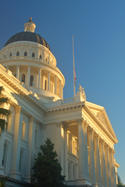The hundreds of millions of dollars in federal stimulus money are working their way through various systems, en route to a city near you.
Give President Barack Obama credit for acting boldly to pump the funds into the economy – or take him to task for printing up money on the cuff.
Either way, the time has come to shift your focus from Washington, D.C., and onto State Houses and City Halls throughout our land. read more »






















